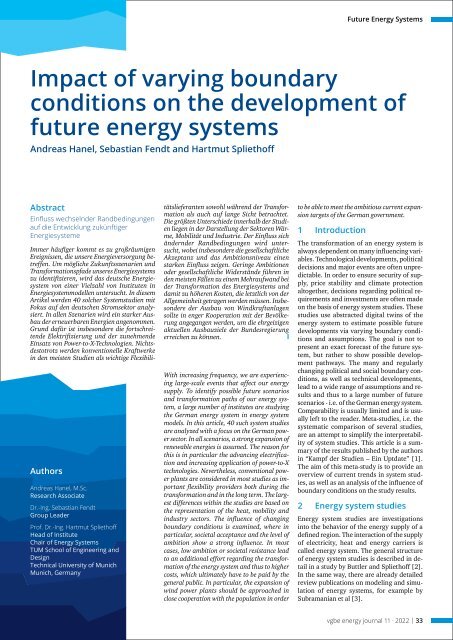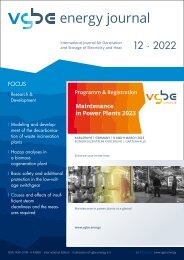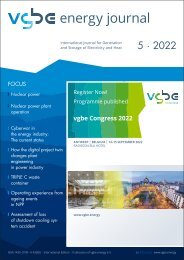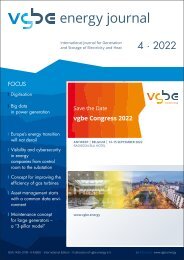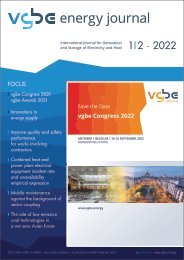vgbe energy journal 11 (2022) - International Journal for Generation and Storage of Electricity and Heat
vgbe energy journal - International Journal for Generation and Storage of Electricity and Heat. Issue 11 (2022). Technical Journal of the vgbe energy e.V. - Energy is us! NOTICE: Please feel free to read this free copy of the vgbe energy journal. This is our temporary contribution to support experience exchange in the energy industry during Corona times. The printed edition, subscription as well as further services are available on our website, www.vgbe.energy +++++++++++++++++++++++++++++++++++++++++++++++++++++++
vgbe energy journal - International Journal for Generation and Storage of Electricity and Heat.
Issue 11 (2022).
Technical Journal of the vgbe energy e.V. - Energy is us!
NOTICE: Please feel free to read this free copy of the vgbe energy journal. This is our temporary contribution to support experience exchange in the energy industry during Corona times. The printed edition, subscription as well as further services are available on our website, www.vgbe.energy
+++++++++++++++++++++++++++++++++++++++++++++++++++++++
- Keine Tags gefunden...
Erfolgreiche ePaper selbst erstellen
Machen Sie aus Ihren PDF Publikationen ein blätterbares Flipbook mit unserer einzigartigen Google optimierten e-Paper Software.
Future Energy Systems<br />
Impact <strong>of</strong> varying boundary<br />
conditions on the development <strong>of</strong><br />
future <strong>energy</strong> systems<br />
Andreas Hanel, Sebastian Fendt <strong>and</strong> Hartmut Splieth<strong>of</strong>f<br />
Abstract<br />
Einfluss wechselnder R<strong>and</strong>bedingungen<br />
auf die Entwicklung zukünftiger<br />
Energiesysteme<br />
Immer häufiger kommt es zu großräumigen<br />
Ereignissen, die unsere Energieversorgung betreffen.<br />
Um mögliche Zukunftsszenarien und<br />
Trans<strong>for</strong>mationspfade unseres Energiesystems<br />
zu identifizieren, wird das deutsche Energiesystem<br />
von einer Vielzahl von Instituten in<br />
Energiesystemmodellen untersucht. In diesem<br />
Artikel werden 40 solcher Systemstudien mit<br />
Fokus auf den deutschen Stromsektor analysiert.<br />
In allen Szenarien wird ein starker Ausbau<br />
der erneuerbaren Energien angenommen.<br />
Grund dafür ist insbesondere die <strong>for</strong>tschreitende<br />
Elektrifizierung und der zunehmende<br />
Einsatz von Power-to-X-Technologien. Nichtsdestotrotz<br />
werden konventionelle Kraftwerke<br />
in den meisten Studien als wichtige Flexibili-<br />
Authors<br />
Andreas Hanel, M.Sc.<br />
Research Associate<br />
Dr.-Ing. Sebastian Fendt<br />
Group Leader<br />
Pr<strong>of</strong>. Dr.-Ing. Hartmut Splieth<strong>of</strong>f<br />
Head <strong>of</strong> Institute<br />
Chair <strong>of</strong> Energy Systems<br />
TUM School <strong>of</strong> Engineering <strong>and</strong><br />
Design<br />
Technical University <strong>of</strong> Munich<br />
Munich, Germany<br />
tätslieferanten sowohl während der Trans<strong>for</strong>mation<br />
als auch auf lange Sicht betrachtet.<br />
Die größten Unterschiede innerhalb der Studien<br />
liegen in der Darstellung der Sektoren Wärme,<br />
Mobilität und Industrie. Der Einfluss sich<br />
ändernder R<strong>and</strong>bedingungen wird untersucht,<br />
wobei insbesondere die gesellschaftliche<br />
Akzeptanz und das Ambitionsniveau einen<br />
starken Einfluss zeigen. Geringe Ambitionen<br />
oder gesellschaftliche Widerstände führen in<br />
den meisten Fällen zu einem Mehraufw<strong>and</strong> bei<br />
der Trans<strong>for</strong>mation des Energiesystems und<br />
damit zu höheren Kosten, die letztlich von der<br />
Allgemeinheit getragen werden müssen. Insbesondere<br />
der Ausbau von Windkraftanlagen<br />
sollte in enger Kooperation mit der Bevölkerung<br />
angegangen werden, um die ehrgeizigen<br />
aktuellen Ausbauziele der Bundesregierung<br />
erreichen zu können. <br />
l<br />
With increasing frequency, we are experiencing<br />
large-scale events that affect our <strong>energy</strong><br />
supply. To identify possible future scenarios<br />
<strong>and</strong> trans<strong>for</strong>mation paths <strong>of</strong> our <strong>energy</strong> system,<br />
a large number <strong>of</strong> institutes are studying<br />
the German <strong>energy</strong> system in <strong>energy</strong> system<br />
models. In this article, 40 such system studies<br />
are analyzed with a focus on the German power<br />
sector. In all scenarios, a strong expansion <strong>of</strong><br />
renewable energies is assumed. The reason <strong>for</strong><br />
this is in particular the advancing electrification<br />
<strong>and</strong> increasing application <strong>of</strong> power-to-X<br />
technologies. Nevertheless, conventional power<br />
plants are considered in most studies as important<br />
flexibility providers both during the<br />
trans<strong>for</strong>mation <strong>and</strong> in the long term. The largest<br />
differences within the studies are based on<br />
the representation <strong>of</strong> the heat, mobility <strong>and</strong><br />
industry sectors. The influence <strong>of</strong> changing<br />
boundary conditions is examined, where in<br />
particular, societal acceptance <strong>and</strong> the level <strong>of</strong><br />
ambition show a strong influence. In most<br />
cases, low ambition or societal resistance lead<br />
to an additional ef<strong>for</strong>t regarding the trans<strong>for</strong>mation<br />
<strong>of</strong> the <strong>energy</strong> system <strong>and</strong> thus to higher<br />
costs, which ultimately have to be paid by the<br />
general public. In particular, the expansion <strong>of</strong><br />
wind power plants should be approached in<br />
close cooperation with the population in order<br />
to be able to meet the ambitious current expansion<br />
targets <strong>of</strong> the German government.<br />
1 Introduction<br />
The trans<strong>for</strong>mation <strong>of</strong> an <strong>energy</strong> system is<br />
always dependent on many influencing variables.<br />
Technological developments, political<br />
decisions <strong>and</strong> major events are <strong>of</strong>ten unpredictable.<br />
In order to ensure security <strong>of</strong> supply,<br />
price stability <strong>and</strong> climate protection<br />
altogether, decisions regarding political requirements<br />
<strong>and</strong> investments are <strong>of</strong>ten made<br />
on the basis <strong>of</strong> <strong>energy</strong> system studies. These<br />
studies use abstracted digital twins <strong>of</strong> the<br />
<strong>energy</strong> system to estimate possible future<br />
developments via varying boundary conditions<br />
<strong>and</strong> assumptions. The goal is not to<br />
present an exact <strong>for</strong>ecast <strong>of</strong> the future system,<br />
but rather to show possible development<br />
pathways. The many <strong>and</strong> regularly<br />
changing political <strong>and</strong> social boundary conditions,<br />
as well as technical developments,<br />
lead to a wide range <strong>of</strong> assumptions <strong>and</strong> results<br />
<strong>and</strong> thus to a large number <strong>of</strong> future<br />
scenarios - i.e. <strong>of</strong> the German <strong>energy</strong> system.<br />
Comparability is usually limited <strong>and</strong> is usually<br />
left to the reader. Meta-studies, i.e. the<br />
systematic comparison <strong>of</strong> several studies,<br />
are an attempt to simplify the interpretability<br />
<strong>of</strong> system studies. This article is a summary<br />
<strong>of</strong> the results published by the authors<br />
in “Kampf der Studien – Ein Uptdate” [1].<br />
The aim <strong>of</strong> this meta-study is to provide an<br />
overview <strong>of</strong> current trends in system studies,<br />
as well as an analysis <strong>of</strong> the influence <strong>of</strong><br />
boundary conditions on the study results.<br />
2 Energy system studies<br />
Energy system studies are investigations<br />
into the behavior <strong>of</strong> the <strong>energy</strong> supply <strong>of</strong> a<br />
defined region. The interaction <strong>of</strong> the supply<br />
<strong>of</strong> electricity, heat <strong>and</strong> <strong>energy</strong> carriers is<br />
called <strong>energy</strong> system. The general structure<br />
<strong>of</strong> <strong>energy</strong> system studies is described in detail<br />
in a study by Buttler <strong>and</strong> Splieth<strong>of</strong>f [2].<br />
In the same way, there are already detailed<br />
review publications on modeling <strong>and</strong> simulation<br />
<strong>of</strong> <strong>energy</strong> systems, <strong>for</strong> example by<br />
Subramanian et al [3].<br />
<strong>vgbe</strong> <strong>energy</strong> <strong>journal</strong> <strong>11</strong> · <strong>2022</strong> | 33


